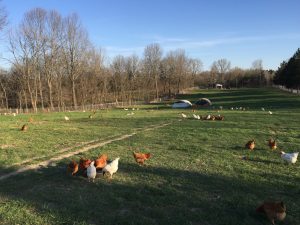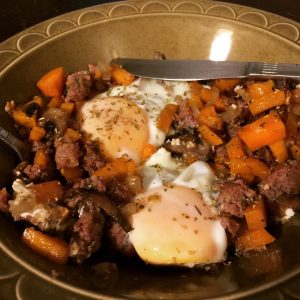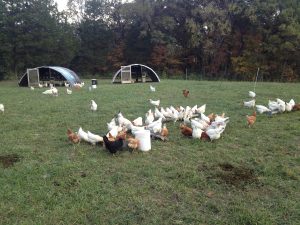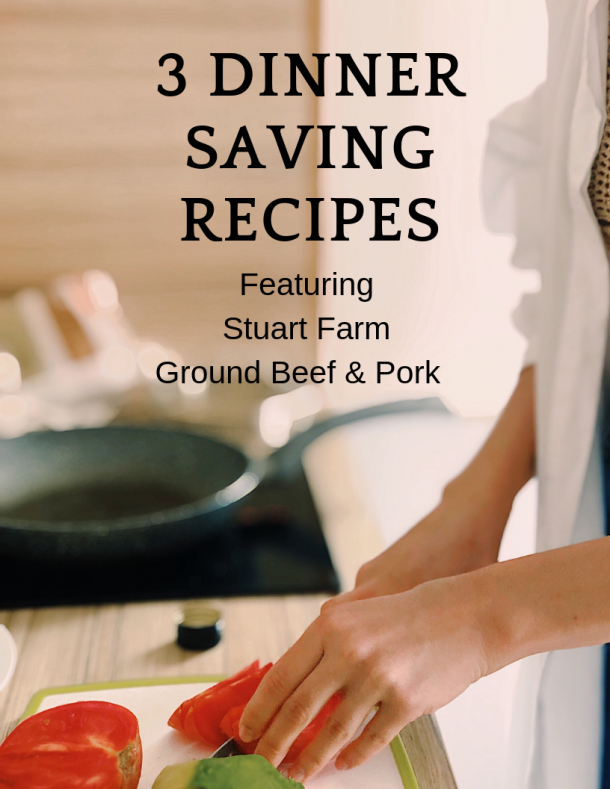 When I first started raising chickens, I read everything I could and asked everyone I knew who had chickens a million questions. Chickens are such fascinating and strange little creatures! So it’s no wonder we get questions about eggs, and the girls who lay them, more than any other topic. Here are your most asked questions.
When I first started raising chickens, I read everything I could and asked everyone I knew who had chickens a million questions. Chickens are such fascinating and strange little creatures! So it’s no wonder we get questions about eggs, and the girls who lay them, more than any other topic. Here are your most asked questions.
Why are some yolks yellow and others orange?
It all comes down to diet. Our girls are moved through the pastures year round. So while they are on grass at all times, the eggs they produce can look different. In the spring, they are eating lush green grass/clover and this can make the yolks VERY orange. I say “can” because not all hens eat the same amount of greens. Some hens forego the feeder for fresh grass, some are just the opposite, so the color of yolk will vary. When the grass isn’t as plentiful and fresh like in winter, the yolks will be more yellow. To get around this, some feeds add in marigold extract and have a lot of corn to help make yolks more orange. We let our girls and the seasons decide the color of their yolks, not feed additives.
Should I store my eggs in the fridge or on the counter?
This is a personal choice and really depends on from whom you buy your eggs. Once an egg has been refrigerated, they should stay refrigerated. When condensation accumulates on the shell from a temperature fluctuation, you risk any bacteria on the shell getting sucked into the shell. Shells have pores that expand or contract with temperature changes. If you buy from a farmer who doesn’t refrigerate their eggs, you can put them in the fridge or keep them on the counter. If you want to keep them on the counter, you should ask your farmer if they wash their eggs (more on that in a minute). After 7-10 days on the counter, the eggs will begin to lose quality; whites will spread more, yolks won’t be as high. It takes a long time for an egg to go rotten, so no worries there, but…
How do I know if an egg is bad?
It takes a lot for an egg to become rotten. We are talking a couple of months outside in the sun. They can lose quality if not properly stored, but the eggs you have in your fridge, very doubtful they will become rotten. Loss of quality is measured by the height of the yolk and the spread of the whites. If an egg has a flattened yolk, or whites that run, it could be that it’s an older egg, or it could be because it was laid by an older hen.
To test if an egg is laid within a week, simply placed it in a glass of water. An egg that stays on the bottom is less than 7 to 10 days old. An egg that leans up or stands on end is about 10-14 days old. The egg floats because the air sac in the egg expands acting as an air bladder. The older the egg, the larger the air sac, the more it floats. Thinned shelled eggs will get a larger air sac faster.
Should I wash my eggs?
This again is a personal choice. Store bought eggs are required to be washed, coated, and sanitized before sale. Depending on the state you are in and whom you are buying from, your eggs may be unwashed. We are not required to and we don’t wash our eggs. Because our eggs are not washed, they have the natural coating, or bloom, that helps keep any bacteria from entering the shell and preserves their quality. If you want to wash our eggs, do so right before cracking and with warm running water for no more than 5 seconds.

Washing eggs is done to clean off dirt and manure. We check our nest boxes regularly throughout the day and make sure nest pads are not soiled. Sometimes an egg will crack, a chicken will sleep and poop in a nest box, or the girls have cow manure on their feet when they go to lay. We do not sell these eggs to customers. If there is dirt that can be flicked away with a swipe of sandpaper, that’s fine. Otherwise, we eat the dirty eggs.
To keep the eggs from absorbing anything into the shell, the washing water must be maintained between 90-120F. While some egg washes say to leave the eggs soaking for 5-10 minutes, this can increase the risk of contamination and is best avoided. I have heard of people cleaning eggs with a Magic Eraser; please do not do this. I’m not sure what’s in the eraser, but I am pretty sure you don’t want it touching your food.

Are your eggs more nutritious than store bought?
We haven’t had our eggs tested for nutrient content, but I can say this: if you are what you eat, you want to eat our eggs! There was a study done comparing the nutrient content of pasture raised eggs to conventional eggs. Overall, pasture raised eggs have 2/3 more Vitamin A, 2 time more omega-3 fatty acids, 3 times more Vitamin E, and 7 time more beta carotene than conventional raised eggs. It also states they have 1/3 less cholesterol and 1/4 less saturated fat. So if you want a snack you can feel good about eating, try an egg.
Do you have to have a rooster to get an egg?
A hen will lay an egg without a rooster. A rooster is needed if you want fertilized eggs to hatch chicks of your own. We keep at least one rooster to act as the flock protector. A rooster will sacrifice himself for the safety of his girls. He also finds food and calls over his girls to make sure they don’t miss out on a tasty morsel.
Do you give your hens antibiotics or hormones?
No and No. If we have a sick or injured hen, they get plenty of TLC and rest in a hospital cage in the house. I mix up special feed with herbs, coconut oil, and kombucha. If the bird has a cut, it is tended to with coconut oil. Our flock has never been, nor needed to be, treated with antibiotics.
Hormone have not been allowed for layers or meat birds since the 1950s. So the claim “hormone-free” really doesn’t mean much. All eggs and chicken are hormone free.
How is pasture raised different from cage-free or free range?
Cage free and free range are regulated by the USDA, pasture raised is not. Cage free means just that, they are not in a cage. But they may be in a barn and never step outside, and there is no standard for how much space each bird should have. If cage free eggs are humane certified, there are spacing standards; usually about 1.5 sq ft per bird. That means in a 12’x12′ space, you can have 96 hens.
Free range means different things depending on whom you buy your eggs from. In large commercial production, the birds have access to the outdoors, but they may not actually ever go outdoors. They just have to have the ability to go out if the choose. Most access doors are small and the birds never find them or are too scared to go through them. The doors will lead to an outside area, that may be a screened in porch and usually not all birds will fit outside at once. If the eggs are free range and certified humane, there is a spacing standards of about 2 sq ft of outdoor space per bird. That 12’x12′ space would have 72 hens. If you buy from a small producer, it’s more likely the birds are roaming the farm, going where they wish (sometimes much to the farmers chagrin). Asking your farmer what they mean by free-range and how they protect the flock from predators is a good idea.
 Pasture raised is basically one of two set-ups. The chickens stay in a coop on pasture and don’t roam much or they are in an electric netting area, they can roam that area, and the coop is moved every couple days. Most producer we know who have pasture raised eggs allow the birds to roam in a netted area for predator protection. Our girls are in a netted area of about half an acre to over an acre (comes out to 174 sq. ft. per hen in a half acre area). Their layer wagon is moved within each area and is left open so they can go out as early and eat as late as they want.
Pasture raised is basically one of two set-ups. The chickens stay in a coop on pasture and don’t roam much or they are in an electric netting area, they can roam that area, and the coop is moved every couple days. Most producer we know who have pasture raised eggs allow the birds to roam in a netted area for predator protection. Our girls are in a netted area of about half an acre to over an acre (comes out to 174 sq. ft. per hen in a half acre area). Their layer wagon is moved within each area and is left open so they can go out as early and eat as late as they want.
I buy organic eggs, those are better, right?
Yes and no. If organic chicken feed wasn’t so expensive and didn’t come for another state, we would feed it. We have chosen to buy our grains locally, so right now non-GMO is our best option. The organic label has more to do with what the hen ate, than living conditions. As with cage free, organic hens must only have access to the outdoors, not living on pasture. So if you are opting for organic, you are not necessarily getting pasture raised eggs.
When will a chicken lay an egg?
Pullets, or chickens who haven’t started laying, can lay their first egg at 5-6 months old depending on the breed. Spring is when egg production picks up. Longer daylight hours signals the girls it’s time to start laying more, and in some cases, try to hatch a clutch of eggs. They begin with pullet, or beginner, eggs. These eggs have the same nutrients and taste as larger eggs, just smaller. Pullet eggs come in all shades of brown, some have spots, some come out almost spherical. It’s interesting to see what they come up with while they figure out their new talent.
A hen can lay an egg every 24-36 hours at peak production. Once Fall comes and the daylight hours shorten, production will drop and they begin to molt. During molt, they will lose a lot of feathers and put more energy into growing new ones to have fresh feathers to keep them warm through the winter. Some producers get around the drop in production by adding supplemental light in the coop to make the hens think it is Spring. Not having this natural break puts added stress on the hens system. We don’t use supplemental lighting.
What should I ask a farmer about their eggs to make sure I am getting what I want?
I want you to get exactly what you want and what you are paying for. I don’t want you to be fooled by buzz words like “hormone-free”; I want you asking questions. With the knowledge you have gained from this post, you should be able to ask these questions and make an informed choice about where you buy your eggs.
- What do you feed your hens?
- How big of a space are they in?
- How much access do they have to grass and roaming?
- Have your eggs been refrigerated?
- Do you wash your eggs and what’s the process you use?
- Do you use extra lighting in the winter?
- Can I visit your farm?
Questions should be welcomed by the farmer. If not, you may want to reconsider buying your eggs from them.
